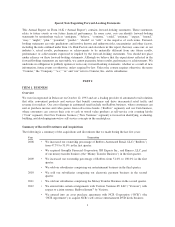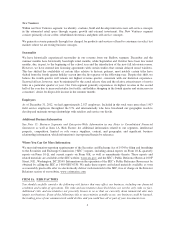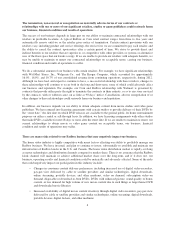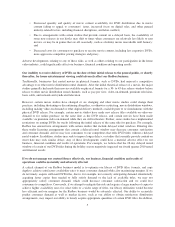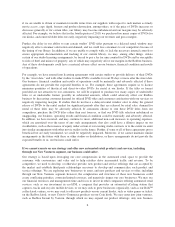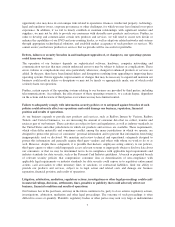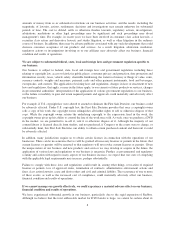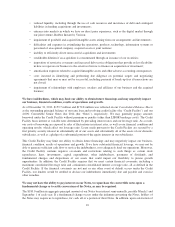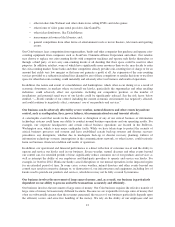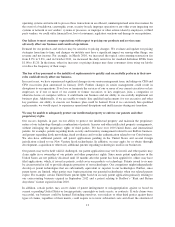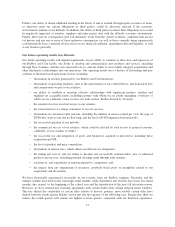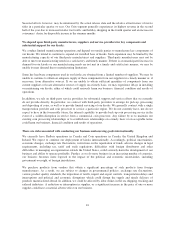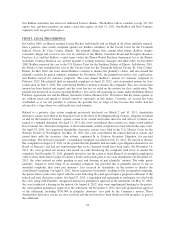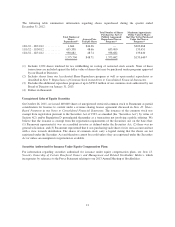Redbox 2012 Annual Report Download - page 18
Download and view the complete annual report
Please find page 18 of the 2012 Redbox annual report below. You can navigate through the pages in the report by either clicking on the pages listed below, or by using the keyword search tool below to find specific information within the annual report.certain conversion conditions (including conditions outside of our control, such as market price or trading price)
and proper conversion of the Notes by a holder, we will be required to make cash payments of up to $1,000 for
each $1,000 in principal amount of such Notes (as well as deliver shares of our common stock if applicable). For
example, at June 30, 2012, our Notes became convertible in and for the third quarter of 2012 at the option of each
holder because the closing sale price of our common stock for at least 20 trading days in a period of 30
consecutive trading days ending on the last trading day of the second quarter of 2012 exceeded 130% of the
applicable conversion price. Depending on the amount and timing of the payment requirements, we may not have
been able to meet all of the obligations relating to Note conversions, which could have had a material adverse
effect.
In addition, our Credit Facility prohibits us from making any cash payments due upon the repurchase or
conversion of the Notes if (i) an event of default then exists or would result from the relevant payment under that
facility or (ii) after giving effect to the relevant cash payment, we would not be in pro forma compliance with our
consolidated leverage ratio test specified in that facility. Any agreements or indebtedness we enter into or incur
in the future may further restrict our ability to pay interest on, carry out the fundamental change repurchase
obligations relating to, or make payments (including cash) upon conversion of, the Notes.
Further, if we fail to pay interest on, carry out the fundamental change repurchase obligations relating to, or make
payments (including cash) upon conversion of, the Notes, we will be in default under the indenture governing the
Notes. A default under the indenture or the fundamental change itself could also lead to a default under
agreements governing our existing and future indebtedness, including our Credit Facility. If the repayment of
indebtedness were to be accelerated, including after any applicable notice or grace periods, we may not, among
other things, have sufficient funds to repay indebtedness or pay interest on, carry out our repurchase obligations
relating to, or make cash payments upon conversion of, the Notes.
Conversion of our convertible notes into common stock could result in additional dilution to our
stockholders.
Upon satisfaction of certain conversion conditions (including conditions outside of our control, such as market
price or trading price) and proper conversion of the Notes by a holder, we may be required to deliver shares of
our common stock to a converting holder. For each $1,000 principal amount of Notes converted, a holder
receives an amount in cash equal to $1,000, and, if the conversion value (as determined by the terms of the
indenture) exceeds $1,000, the holder will also receive a number of shares of our common stock based on the
excess conversion value. The number of shares of common stock potentially to be issued upon conversion of the
Notes increases as the market price of our common stock increases during the conversion value measurement
period. If additional shares of our common stock are issued due to conversion of some or all of the outstanding
Notes, the ownership interests of existing stockholders would be diluted. Further, any sales in the public market
of any shares of common stock issued upon conversion or hedging or arbitrage trading activity that develops due
to the potential conversion of the Notes could adversely affect prevailing market prices of our common stock.
Competitive pressures could seriously harm our business, financial condition and results of operations.
Our Redbox business faces competition from many other providers, including those using other distribution
channels, having more experience, greater or more appealing inventory, better financing, and better relationships
with those in the movie and video game industries, than we have, including:
• mail-delivery and online retailers, like Netflix or Amazon;
• cable, satellite, and telecommunications providers, like Comcast or DISH Network;
• traditional movie programmers, like HBO or Showtime;
• other forms of movie content providers like Internet sites including iTunes, YouTube, Hulu or Google;
• traditional brick and mortar video retailers, and other DVD kiosk businesses;
11


